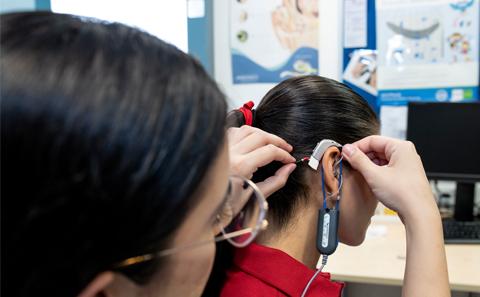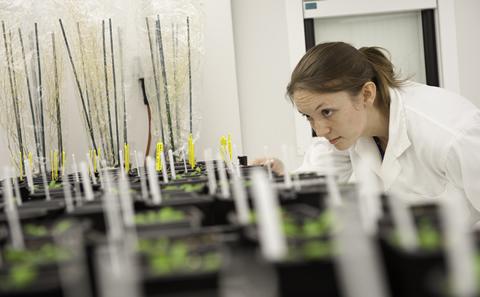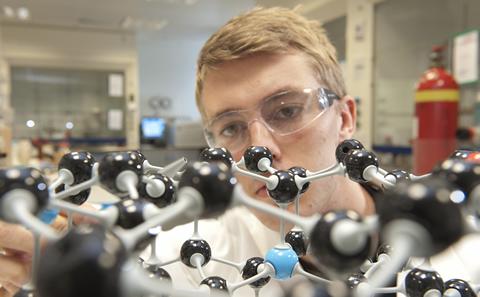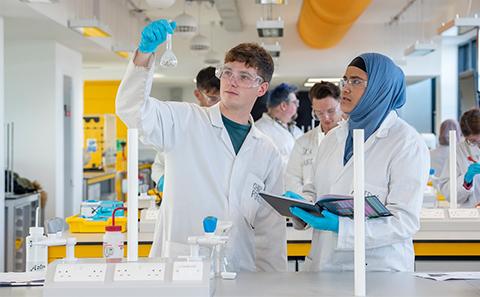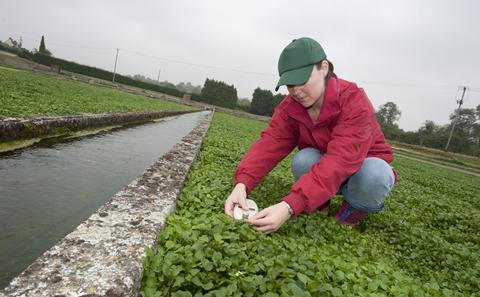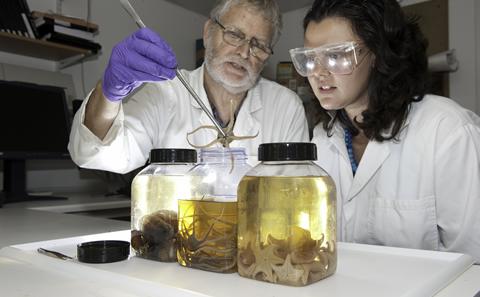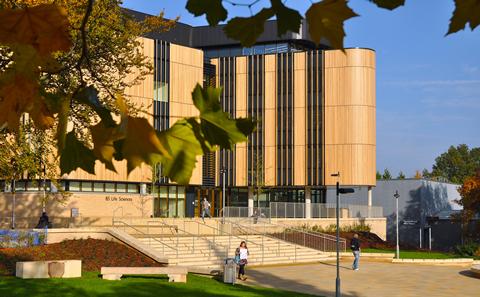The Degree Programmes available with the Science Foundation Year are listed below, along with their UCAS codes. Applications for the Science Foundation Year should be made via UCAS using the code relevant to your chosen course.
Audiology
BSc Audiology
MSci Audiology
Biological Sciences courses
BSc Biochemistry
BSc Biomedical Sciences
BSc Pharmacology
BSc Biology
BSc Zoology
BSc Neuroscience
Master of Neuroscience
MSci Pharmacology & Drug Discovery
Chemistry courses
BSc Chemistry
MChem Chemistry
Chemical Engineering
BEng Chemical Engineering
MEng Chemical Engineering
Environmental Science courses
BSc Environmental Science
Health Sciences
BSc Cardiac Physiology
BSc Midwifery
BSc Occupational Therapy
BSc Physiotherapy
Ocean and Earth Science courses
BSc Biology with Marine Biology
BSc Geology
BSc Oceanography
BSc Marine Biology
BSc Marine Biology with Oceanography
BSc Environmental Geoscience
To Apply
To apply for the Science Foundation Year you will need to choose the course that you wish to combine it with and then apply through UCAS. The UCAS codes for the courses available with the Science Foundation Year are listed below.
F652 Environmental Geoscience with Foundation Year
F7C3 Marine Biology with Oceanography with Foundation Year
7N18 Biology and Marine Biology Foundation Year
C702 Biochemistry with Foundation Year
B941 Biomedical Science with Foundation Year
B142 Neuroscience with Foundation Year
B211 Pharmacology with Foundation Year
C103 Biology with Foundation Year
C302 Zoology with Foundation Year
B614 Audiology with Foundation Year
F108 Chemistry with Foundation Year
H804 Chemical Engineering with Science Foundation Year
H805 Chemical Engineering with Science Foundation Year and Industrial Placement
F602 Geology with Foundation Year
F705 Marine Biology with Foundation Year
F701 Oceanography with Foundation Year
F903 Environmental Science with Foundation Year
B721 Midwifery with Foundation Year
B123 Cardiac Physiology (Healthcare Science) with Foundation Year
B921 Occupational Therapy with Foundation Year
B162 Physiotherapy with Foundation Year
Other Foundation Years
Looking for a Foundation Year for a different subject?
Don't meet our language requirements?
Pre-sessional English language course
Key Facts
- Guaranteed progression onto chosen undergraduate degree (providing you achieve minimum progression grades)
- Choice of 16 undergraduate degree disciplines on completion
- A great choice for you if you are looking to change direction
Studying at Southampton
Learn more about your chosen subject and what it's like to study it at Southampton on the relevant school website.
For Audiology courses and information
For Biology, Biomedical Sciences, Pharmacology and Zoology courses.
For Chemical Engineering courses.
For Environmental Science
For Oceanography, Marine Biology and Geology courses.
Typical entry requirements
Entry requirements for September 2024 entry
All applicants must hold:
- GCSE English language (or GCSE English) at minimum grade 4/C
- GCSE Mathematics at minimum grade 5 and GCSE Combined Science at minimum grade 5-5 or two GCSE Science subjects (Biology, Chemistry or Physics) at minimum grade 5
As well as 1 of the following Level 3 qualifications:
| Qualification | Grade |
|---|
| GCE A-Level |
ABB. If you have not taken two science subjects at A-Level as normally required for direct entry, then you will usually need a Foundation Year. You will need an aptitude for science, which may be demonstrated by recent study (along with good GCSE grades in science and maths). |
| GCE A-Level with Contextual offer |
We are committed to ensuring that all students with the potential to succeed, regardless of their background, are encouraged to apply to study with us. The additional information gained through contextual data allows us to recognise a student’s potential to succeed in the context of their background and experience. |
| GCE A-Level with EPQ offer |
If you are taking an EPQ in addition to 3 A levels, you will receive the following offer in addition to the standard A level offer: BBB and grade A in the EPQ |
| Welsh Baccalaureate offer |
Welsh Baccalaureate offer - AB from 2 A levels and Grade B from the Advanced Welsh Baccalaureate Skills Challenge Certificate. |
International Baccalaureate Diploma
offer |
Pass with 32 points overall with a minimum of 16 points at Higher Level. |
International Baccalaureate Career Programme (IBCP)
offer |
Offers will be made on the individual Diploma Course subject(s) and the career-related study qualification. The CP core will not form part of the offer. Where there is a subject pre-requisite(s), applicants will be required to study the subject(s) at Higher Level in the Diploma course subject and/or take a specified unit in the career-related study qualification. Applicants may also be asked to achieve a specific grade in those elements. Please see the University of Southampton International Baccalaureate Career-Related Programme (IBCP) Statement for further information. Applicants are advised to contact their Faculty Admissions Office for more information. |
| Access to HE Diploma offer |
Access to HE Diploma offer - 60 credits overall with a minimum of 45 credits at level 3 of which 30 credits must be at Distinction and 15 at Merit. |
| Irish Leaving Certificate offer (first awarded 2017) |
Irish Leaving Certificate offer (first awarded 2017) - H1, H2, H2, H2, H3, H3 |
| Irish Leaving Certificate offer (last awarded 2016) |
AABBBB |
| Scottish Qualification offers |
Offers will be based on exams being taken at the end of S6. Subjects taken and qualifications achieved in S5 will be reviewed. Careful consideration will be given to an individual’s academic achievement, taking in to account the context and circumstances of their pre-university education. Please see the University of Southampton’s Curriculum for Excellence Scotland Statement for further information. Applicants are advised to contact the Admissions Office for more information. |
| Cambridge Pre-U offer |
Cambridge Pre-U offer - D3, M2, M2 |
| Level 3 BTEC (QCF) offer (unreformed) |
Level 3 BTEC (QCF) offer (unreformed) - DDM in the BTEC National Diploma to include Distinctions in the majority of modules. |
| Level 3 BTEC (RQF) offer (reformed) |
Level 3 BTEC (RQF) offer (reformed) - DDM in the BTEC National Extended Diploma to include Distinctions in the majority of modules. |
| European Baccalaureate offer |
74%-75% overall to include grade 6 in Mathematics. |
| T Level |
A Distinction overall with a grade A in the core element. |
| International qualifications |
Find a list of accepted international qualifications listed by country. This is a list of the international qualifications that are recognised by the University of Southampton. If you are not sure that your qualifications meet the requirements of this course please contact our Admissions Teams. |
| English language requirements |
All applicants must demonstrate they possess at least a minimum standard of English language proficiency. Applicants requiring a visa to study in the UK who do not offer GCSE English language (or GCSE English) at the required level will need to meet the following English language proficiency requirement. Find out more about the University’s English Language requirements. Band C IELTS 6.5 overall, with a minimum of 6.0 in all components. |
BTEC
Our offer for students who have studied a BTEC is typically DDM with distinctions in the majority of modules.
Other applicants
Mature applicants are especially welcome and will be considered on an individual basis. We will be looking for some recent study (e.g. an AS or A-Level, completed OU modules) and for work experience relevant to your preferred subject area. You will need to show an aptitude for mathematics and science and may be invited to an interview.
International students
If you can show a proven ability in science and maths, but you come from a region or country where an A-Level equivalent standard in other qualifications approved by the University is not available, you may be considered for the Foundation Year.
English language
If English is not your first language, we ask you to obtain a recognised language qualification. If you can demonstrate that you have achieved IELTS 6.5 with at least 6.0 in each band, or an equivalent standard in other qualifications approved by the University, you will be able to join the course without the need for additional English language classes.
If you have not yet reached IELTS 6.5 but plan to be based in Southampton, you could consider taking a separate preparatory language course.
Selection process:
Each application is considered individually. However, whether you are coming directly from full-time education, or from a different background, you need to demonstrate an aptitude for maths and science. This could be through recent qualifications (for example, as a mature student you may have already completed Open University modules), relevant work experience or both.
Audiology
Your application should provide evidence of:
- A clear and strong motivation to study audiology
- A caring and compassionate approach
- Personal values and attitudes that align with those of a health care professional
- Realistic insight into the role of an audiologist
As part of the selection process candidates will be required to participate in a group task during a visit to the University before they start their Science Foundation Year with Audiology course.
Non-academic conditions: Progression on to the undergraduate Audiology degree programme is subject to satisfactory Health and Criminal Record checks.
All students must pass an Occupational Health check before they can progress to Audiology from the Science Foundation Year and all students must pass a Disclosure and Barring Service (criminal record) check at the start of the Audiology course.
This page contains specific entry requirements for this course. Find out about
equivalent
entry requirements and qualifications for your country.
Typical course content
Whatever degree course you are aiming for, you will take all the modules listed below. All modules are studied for the whole year and are assessed through both coursework and examination. The coursework module integrates elements from the different disciplinary modules and is assessed by a range of approaches. The examinations held in January carry 40% of the marks and those held in June carry 60% of the marks for each disciplinary module.
Modules
Semester 1
GSCI0013 Fundamentals of Biology I
GSCI0014 Fundamentals of Chemistry I
Semester 2
GSCI0015 Fundamentals of Biology II
GSCI0016 Fundamentals of Chemistry II
Whole year
GSCI0010 Mathematics for Scientists
GSCI0011 Laboratories and Coursework
GSCI0012 Routes to Success for Scientists
Please note: information included was correct at time of publication, March 2024
Please note: This specification provides a concise summary of the main features of the
programme and the learning outcomes that a typical
student might reasonably be expected to achieve and demonstrate if s/he takes full advantage
of the learning opportunities that are provided.
More detailed information can be found in the programme handbook (or other appropriate guide
or website).
Tuition fees
The foundation year fee is separate from your undergraduate degree fees. You'll pay the fee for your foundation year, and then the yearly fee for your degree. Once you start your undergraduate degree the amount you pay each year will stay the same. You can check the fees on the individual course pages.
List of tuition fees for this course and it's variations| Name | Award | Year of entry | Mode of study | UK/EU | International |
|---|
| Biochemistry/Biomedical Sciences/Pharmacology Foundation Year | BSc | 2024/25 | Full-time | £9,250 | £23,620 |
| Biochemistry/Biomedical Sciences/Pharmacology/Neuroscience Foundation Year | BSc | 2024/25 | Full-time | £9,250 | £23,620 |
| Biology/Zoology Foundation Year | BSc | 2024/25 | Full-time | £9,250 | £23,620 |
| Biomedical Electronic Engineering Foundation Year | BEng | 2024/25 | Full-time | £9,250 | £23,620 |
| Biomedical Electronic Engineering Foundation Year | MEng | 2024/25 | Full-time | £9,250 | £23,620 |
| Chemistry Foundation Year | BSc/MChem | 2024/25 | Full-time | £9,250 | £23,620 |
| Environmental Science Foundation Year | BSc/MEnvSci | 2024/25 | Full-time | £9,250 | £23,620 |
| Geology Foundation Year | BSc | 2024/25 | Full-time | £9,250 | £23,620 |
| Geophysics Foundation Year | BSc | 2024/25 | Full-time | £9,250 | £23,620 |
| Marine Biology Foundation Year | BSc | 2024/25 | Full-time | £9,250 | £23,620 |
| Oceanography Foundation Year | BSc | 2024/25 | Full-time | £9,250 | £23,620 |
| Science Foundation Year | BSc | 2024/25 | Full-time | £9,250 | £23,620 |
There may be funding available for the course you progress to after the Science Foundation Year. Funding opportunities can be found on the relevant course pages.
There are no additional costs for the Science Foundation Year. Any additional costs for the course you progress to can be found on the relevant course pages.
Explore funding opportunitiesCosts associated with this course
Students are responsible for meeting the cost of essential textbooks, and of producing such
essays, assignments, laboratory reports and dissertations as are required to fulfil the
academic requirements for each programme of study.
In some cases you'll be able to choose modules (which may have different costs associated
with that module) which will change the overall cost of a programme to you. Please also
ensure you read the section on additional costs in the University’s Fees, Charges and
Expenses Regulations in the University Calendar available at www.calendar.soton.ac.uk.
